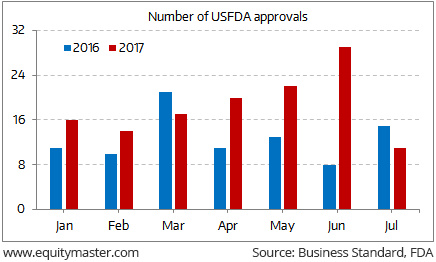Sensex Trades On A Volatile Note; Capital Goods Stocks Top Gainers
After opening the day marginally lower, share markets in India witnessed volatile trading activity and are presently trading in the red. Sectoral indices are trading on a mixed note, with stocks in the capital goods sector and stocks in the IT sector witnessing maximum buying interest. While stocks in the metal sector are leading the losses.
The BSE Sensex is trading down by 130 points (down 0.4%) and the NSE Nifty is trading down by 50 points (down 0.5%). Meanwhile, the BSE Mid Cap index is trading down by 0.2%, while the BSE Small Cap index is trading down by 0.5%. The rupee is trading at 65.31 to the US$.
In news from stocks in the pharma sector. Divi's Lab share price witnessed buying interest in early trade today after the company said that the US Food and Drug Administration (USFDA) has lifted import alert imposed on its unit at Visakhapatnam.
The company said that the US health regulator completed the inspection of the corrective action and measures initiated by the company and closed out the warning letter.
Last week, Divi's Labs had announced that the US health regulator would lift an import alert imposed on the company's Unit-II in Visakhapatnam and was moving to close out the warning letter issued to the unit.
The USFDA in March had issued import alert, and a warning letter later for the Visakhapatnam facility for non-compliance of good manufacturing practice (GMP) norms, the company had informed bourses earlier.
The company in July announced that USFDA had moved to lift import alert imposed on the unit.
The Indian pharmaceutical industry has come under a lot of regulatory pressure in the past few years.
The list of pharma sector woes is long. So, is there light at the end of the tunnel? Girish Shetty, our research analyst thinks there is.
As per him, it doesn't make sense to paint all pharma stocks with the same brush. The leaders of the industry will certainly survive this phase. There are interesting, niche pharma stocks that are worth your attention.
Facing pricing pressures in the domestic and export markets, currency fluctuations, as well as manufacturing issues related to their plant, there is a transformation happening in the overall sector as to how business is done and will be done in the future.
USFDA sweetener for Indian Pharma

In recent times, pharma companies were bogged down by mounting pressure from US Food and Drug Administration (USFDA) to adhere to quality standards at their manufacturing plants. In the past three years, the USFDA raised numerous regulatory concerns resulting in import bans and suspension of new drug approvals from facilities of Indian pharma companies. But what has come as a breather is a sharp pick-up in new drug approvals in 2017. During the period January-July 2017, 129 approvals for generic drugs were made. This is 45% higher from 89 approvals made in the corresponding period last year.
As per the Indian Pharmaceutical Alliance, the pace of drug approvals has gained momentum after they complained to FDA about delays last year. Approvals for drugs have also picked up after USFDA concerns at some of the manufacturing units were addressed.
At the time of writing, Divi's Lab share price was trading flat.
Moving on to news from stocks in the banking sector. According to a leading financial daily, State Bank of India (SBI) has initiated the process of selling Rs 15.8 billion worth of bad loans on its books to financial institutions like asset reconstruction companies (ARCs).
The bank has put on block 11 non-performing assets (NPA) for sale through a bidding process, according to a tender on the bank's website.
Last month, the country's largest lender put Rs 35.5 billion of bad loans up for sale. In that auction, it received bids only for a portion of the total; SBI is awaiting final approvals to go ahead with the sale. The bank managed to sell off Rs 7.6 billion worth of bad loans to ARCs in the first half of the current financial year.
Public sector banks have been caught in a bad loan mess. To strengthen their shaky balance sheets, the government recently announced a Rs 2.11 trillion recapitalisation plan. However, this is unlikely be another easy bail-out. The Financial Services Secretary has clearly stated that the extent of capital infusion will depend on the swift implementation of reforms carried out by the bank board. The reforms need to focus on the kind of business that the bank wants to target and how it wants to go ahead.
State-run banks urgently need to reorient their fundamental business models if they must remain competitive and relevant in future. As per a report by the Boston Consultancy Group, banks continue to dominate in the traditional banking areas of deposit and advances that are also the principal revenue generators for them. But in non-conventional areas, such as distribution of insurance and mutual fund products, investment banking, and corporate advisory for debt capital markets, banks lagged behind non-banking companies.
The competitive intensity in the retail banking segment has heightened with the entry of small finance banks and non-banking financial companies upping their ante. Going ahead, payment banks are also expected to eat into the fee business of regular banks. Therefore, public sector banks need to build alternative income sources through bancassurance and investment banking if they are to retain their clout in future.
At the time of writing, SBI share price was trading down by 0.6%.
Disclaimer: Equitymaster Agora Research Private Limited (hereinafter referred as 'Equitymaster') is an independent equity research Company. Equitymaster is not an Investment Adviser. ...
moreComments
 No Thumbs up yet!
No Thumbs up yet!



